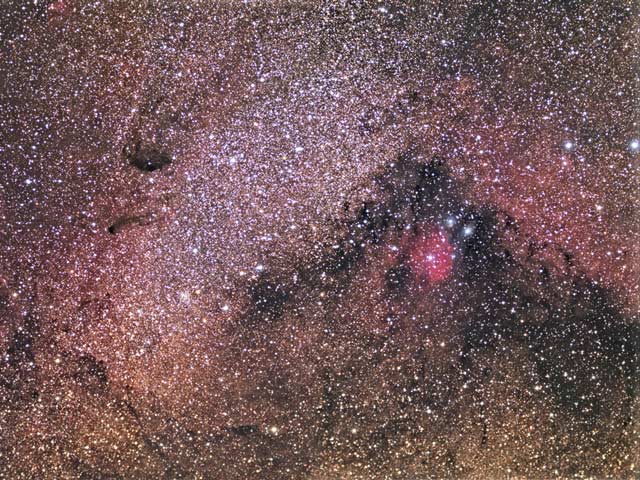
Guest Post by Joseph Hurtgen: For its grand narratives, space opera borrows from the horse opera or western. The horse opera relies on a 19th-century vision of American progress, relying on the mythos of finding vitality and riches as a result of westward expansion; space operas map similar assumptions onto galactic expansion. Indeed, space opera constitutes a comprehensive reworking of westerns and lost-race stories, even getting its name from the western horse opera.
Westerns, centering around progress, were easy for space operas to appropriate, and space opera transposes many superficial elements and overriding themes from the western genre. Bank robbers and data pirates alike challenge the establishment of governance over wild, untamed space. But lawmen enforce the dictum of progress, riding horseback or in spaceships across vast unsettled territories or galaxies in pursuit of outlaws: the vastness and lawlessness of the old West has its binary in the vastness of space. The challenge of seeing progress through is visually punctuated by those vast and empty vistas. Another challenge to progress comes in the form of the other, whether in the guise of native populations or aliens. These figures often read as a roadblock to progress and manifest destiny, standing in the way of “going boldly . . . ”
The background of manifest destiny is space opera’s most important link to the horse opera. America’s western frontier comprised a vast, uncivilized space for the young American nation to conquer and, in so doing, exercise its sovereignty, preparing the nation for its later status as a colonial, military, and economic superpower. Manifest destiny was a crucial part of the great American dream of progress. By conquering the lands west of the Mississippi, subduing the native populations there and bringing order to the wild, Americans would annex a country excelled in area by only Russia. Controlling the resources of 3.8 million square miles would secure the United States’ position as a major player in global politics and trade. In effect, westward expansion meant progress. Horse operas operate under the mythos of taming the wild west to fulfill the dictum of progress. Given that westerns trade in nostalgia, the actions of heroes in westerns are always interpreted as moving the country ever toward its glorious future.
The first space operas were overlaid with the theme of progress, the western’s thematic raison d’etre. That borrowed sense of progress took on the same assumptions about race and nationality as Western narratives. That is, indigenous tribes, aliens, or really just anyone non-white and non-American or non-European, depending on the derivation of the tale, stand in as figures to dominate as a way of achieving the dream of progress.
The ideal of progress was rationalized as a guiding principle of Western political philosophy beginning in the 19th century. W.G.F Hegel’s concept of spirit held that history, read as human history, was on a trajectory toward the creation of a perfect society. But, problematically for non-Europeans, the perfect society was perceived as Western. Thus, Hegel’s vision of progress was used to justify Western imperialism, with all of its barbaric practices. Space opera, a subgenre that plays with ideas of galactic empires with worlds to conquer, reflects the aims and impetus of empire as progress. It’s not hard to see that the most popular space operas–Star Wars and its ilk–focus on the grand themes of history, the rise and fall of galactic empires.
Alastair Reynolds, a popular space operator, connects his fictional worlds to the Western project of political philosophy to achieve human progress through governmental intervention. In The Prefect,Reynolds describes the citizens of the Glitter Band as incapable of being trusted with “absolute freedom” (Reynolds 2007: 90), a time tested justification for increasing governmental power over citizens. Reynolds all but spells out the social contract theory of thinkers like Thomas Hobbes and Jean-Jacques Rousseau: “Too much power had been devolved to the habitats. For their own safety, central government needed to be reasserted” (Reynolds 2007: 90). And again, engaging with social contract theory, Reynolds considers what would occur if people were, sans government, “abandoned to their own worst natures” (Reynolds 2007: 90). Reynolds uses the language and argumentation of the Western ideal of progress through government intervention, removing autonomy from the individual to ensure a safe, ordered society.
Progress as a theme has a double side. What counts as a challenge to the Metropole is progress for the colonized other. The nascence of the space opera, a post-world-war 20th century, came at a time when the practice of colonization was in fierce review. Populations that had at one time existed in innocence to the technologies and practices of civilized nations were now in possession of the products and techniques that had once set them apart from colonizing powers. This plays out in space opera with aliens and hybrid figures commandeering the flagships of the empire to defend their pocket of the universe or strike out in search of their own worlds to conquer.
Progress for one group is almost always destruction for the other, even when space is unlimited. Perhaps over the millennia, evolutionary pressures have hardcoded humans with a desire to hoard resources while denying others what they need. The progression of others reads as a threat to our own survival. Consider, to that end, the shadows cast by the sun-eclipsing flying saucers of Independence Day. Yes, the cost of progress is almost always that somebody else has to go down in a blaze of laser glory. And the great conflict of the narrative of progress is that, all too often, the figure standing in for our cultural hero is in someone else’s crosshairs.
Joseph Hurtgen is a Ph.D. in English Literature, specializing in Science Fiction. He writes mind-expanding science fiction and analyzes sci-fi on his blog, Rapid Transmission.
Discover more from File 770
Subscribe to get the latest posts to your email.
